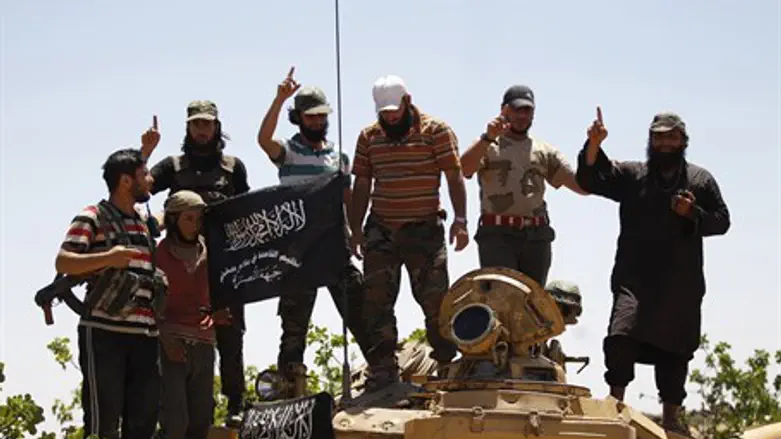
The Obama administration is concerned that terrorists in war-ravaged Syria are trying to develop a new generation of bombs that could be smuggled onto commercial planes, ABC News reported on Sunday.
As a result, Washington may ask overseas partners to enhance security measures at airports and is weighing whether to do the same at home, the report said.
"[This threat] is different and more disturbing than past aviation plots," one source told ABC News.
The issue was discussed this past week at the White House during a meeting of top-level officials from intelligence agencies, sources said.
For months the Department of Homeland Security, FBI and other agencies have been quietly debating whether to boost the U.S. security posture and encourage overseas partners to take action too. The agencies have also been debating whether to make a public announcement on potential new security measures at airports, according to ABC News.
The back-and-forth has been based on intelligence showing that a particularly extreme "subset" of terrorist groups in Syria was working alongside operatives from Al-Qaeda's prolific offshoot in Yemen to produce "creative" new designs for bombs, as one source put it.
Specifically, U.S. officials learned that associates of the Al-Qaeda affiliate in Syria - the Al-Nusra Front - and radicals from other groups were teaming up with elements of the Yemen-based group Al-Qaeda in the Arabian Peninsula, which built such innovative devices as the "underwear bomb" that ultimately failed to detonate in a plane over Detroit in 2009.
Bolstered by more recent intelligence, U.S. analysts believe the "subset" of extreme terrorists in Syria could be looking to down a U.S.- or European-bound plane, with help from one of the thousands of Americans and other foreign fighters carrying U.S. and European passports who have joined Al-Nusra Front and other groups in the region, according to ABC News.
Intelligence obtained by the U.S. government, however, has not indicated a specific target or a specific timeline.
The head of Al-Nusra Front has pledged allegiance to Al-Qaeda chief Ayman al-Zawahiri, and the group has been blacklisted as a terrorist organization by both the U.S. and the United Nations.
Western powers have already expressed concern that some of their citizens have traveled to fight in the civil war in Syria, some of them joining extremist groups that might one day seek to strike their home countries.
It has already been confirmed that one American citizen carried out a suicide bombing within Syria; in February it was estimated that at least 50 U.S. citizens are fighting in Syria against Assad, and are liable to bring terrorism back to their home country once the war is over.
ABC News noted that while U.S. officials have been outspoken about the dangers posed by Al-Qaeda in the Arabian Peninsula and – separately – the threat of foreign fighters in Syria, the latest intelligence shows that the two threats have bonded in an unusually powerful way, essentially creating a sum more worrisome than its parts.
After coming across the initial thread of intelligence earlier this year, U.S. officials, in regular consultation with the White House, began developing plans and potential security measures to address the threat.
The development of those plans is now in its final stages, according to sources who spoke to the network.
One source said new measures at American airports could include increasing the rates of random screenings at airports, targeting certain types of travelers, or more obvious changes for travelers going through security lines.
The potentially lethal partnership in Syria is at least part of what sparked an advisory to airlines earlier this year to look out for explosives-laden toothpaste tubes, cosmetics and shoes.
Rep. Peter King, a top Republican on the House Homeland Security Committee, said security at airports overseas is "a real concern" to officials in the U.S. and that the federal government needs to be "very aggressive" is responding to it.
"I can’t go into all the details but that is very important to do because a number of airports do not have the type of security that they should have," King said Sunday on ABC News' "This Week," speaking about boosting measures at airports overseas.

